Maldives Travel Guide
Welcome to the taste2travel Maldives Travel Guide!
Date Visited: November 2017
Introduction
Mention the Maldives and most people rightly think of opulent, luxurious holidays spent at a private-island resort. Tourism in the Maldives began in 1972, with the opening of two resorts and, since then, the number of tourists visiting the country has risen steadily, with 105 resorts today catering to the needs of holiday makers.

Painted coconut souvenir from the art studio of Ibrahim Shinaz of Maafushi Island.
Up until 2009, tourists were required to stay in these isolated resorts which are built on uninhabited, private islands where all services are offered within the island, and where guests have little contact with the local people.

The view from my TMA flight from Malé to Vilamendhoo Resort.
In that year, the government made regulatory changes, allowing tourists to stay in guest houses among the local population on inhabited (i.e. public) islands, rather than just in exclusive, private-island resorts.

Maafushi is open to independent travelers.
The main aim of the change in policy was to create new jobs and allow more Maldivians to enjoy the benefits from tourism. This has led to a building boom in guest house accommodation – nowhere more so than Maafushi Island, which is a short speedboat ride from the airport and Malé. It has also allowed travelers to mix freely with the local population.

Young girl on Maafushi Island.
Other inhabited islands are now starting to develop tourist infrastructure. At present a window of opportunity exists for travelers who wish to explore these tropical paradise isles before the tourist hoards arrive. Now is the time to visit the Maldives, and while there, I would recommend indulging yourself with a stay at one of the many fine resorts.

Colourful street art on Maafushi Island.
Splitting my visit into three parts, I spent time in a resort (see ‘Deluxe Travel‘ below), before moving onto Maafushi Island (see ‘Independent Travel‘ below) and finally some time spent exploring Malé.
Location
Maldives
The Maldives is an archipelago of 1,192 coral islands grouped into 26 coral atolls (200 inhabited islands, plus 80 islands with tourist resorts).

A map of the Maldives printed onto a sarong.
Located in the Indian Ocean, the Maldives lie southwest of Sri Lanka and India and comprise a territory spanning roughly 298 square kilometres (115 square miles).
The country is one of the most geographically dispersed in the world and is the smallest country in Asia – both in terms of land area and population (427,756 inhabitants).
The Maldives has the distinction of being the World’s flattest country with an average elevation of just 1.8 metres (6 feet). The highest point in the country is just 2.4 metres (8 feet) above sea level.
History

Traditional boat-building is still practised on Maafushi island.
Early History & Buddhism
Archaeological finds reveal that the Maldives were inhabited as early as 1500 BC, with the first settlers arriving around 500 BC from Persia.
Prior to Islam, the inhabitants of the Maldives practiced Buddhism, with the country remaining a Buddhist kingdom for a period of 1,400 years.

Boat building techniques haven’t changed in centuries (except for the use of power tools).
It was during this time that the culture of the Maldives developed and flourished, with the Maldivian language, script, architecture, customs and manners being established.

A traditional wooden Dhoni on Maafushi Island.
Thaana Script ( )
)

Thaana script on Maafushi Island.
Looking like strangely stylised Arabic, the script of the Maldives – Thaana – was developed during the 18th century by an unknown inventor and is based on an earlier script – Dhives Akuru.

Thaana script in Malé.
Like Arabic, Thaana is written right to left, and is widely used throughout the Maldives.
Islam

Historical cemetery on the grounds of the Friday mosque in Malé – the oldest mosque in the Maldives.
Despite it’s strong Buddhist foundation, constant contact with Arab traders saw the country finally convert to Islam in 1153 AD. The first Muslim Sultan of the Maldives was Mohamed Bin Abdullah who ordered the construction of the first mosque in 1153 on the site of the present-day Friday Mosque in Malé.
Today, Islam is the state religion of the Maldives and, as per the constitution, it’s citizens are legally required to adhere to it. The constitution also states “that a non-Muslim may not become a citizen of the Maldives”. Despite the legal requirements – and like other Asian Muslim nations such as Malaysia and Indonesia – a milder version of Islam is practiced in the Maldives.
Colonial Period
Despite attempts by colonial powers to claim the Maldives, the country has remained an independent state throughout most of it’s history. The country was occupied for a brief period of 15 years by the Portuguese in the 16th century and voluntarily accepted a period of British protection which lasted from 1887 to 1965. During this period, the Sultan remained head of state, there was no British Governor or representative and Britain did not interfere in the country’s internal affairs.
Maldives Today

In an atoll nation like the Maldives, boats are the main form of transport.
The Maldives today is economically prosperous and is characterised by peace, stability and growth. Tourism is the main economic activity, accounting for 28% of GDP and more than 60% of the Maldives’ foreign exchange receipts. The country also has a large fishing industry.
While Maldivians are enjoying a period of prosperity, the biggest threat to the country emanates from the outside world – specifically global warming and rising sea levels.
Global Warming – a nation under threat…

The low-lying islands of the Maldives, such as Maafushi Island, feature white sandy beaches with fringing coral reefs.
Being the World’s flattest country, with an average elevation of just 1.8 metres (6 feet), the Maldives is at more risk than any other from the threat posed by Global Warming and rising sea levels.
Current scientific projections estimate that by the year 2100, sea levels could rise by .80 metres (2.6 feet) or as much as 2 metres (6.6 feet), depending on how much water is released from glacial and ice sheet melt. Scientists estimate the Maldives would lose 77% of its land area by the end of the century.
Along with other atoll countries – Kiribati, Marshall Islands, Tokelau and Tuvalu, the Maldives is a member of CANCC – the Coalition of Low Lying Atoll Nations, whose aim is to focus global attention on the affects of rising sea levels on the member countries.
Apart from the loss of land, rising sea levels also pose other risks such as periodic flooding from storm surge, and a scarcity of freshwater. Rising sea temperatures are also impacting the Maldives. In 2016, record high water temperatures – caused by climate change and the “El Nino” phenomenon – resulted in a coral ‘bleaching‘ event which affected 60% of reefs.
To leave or stay?
The policy of the previous government was to leave. This was to be achieved by finding suitable land elsewhere (India or Sri Lanka were two options) and relocating the population.
The current governments’ policy is to stay. To do this, they have embarked on a number of ambitious land reclamation projects, ensuring any new land is built at a higher elevation. The poster child for this program is the island of Hulhulmalé, which is located northeast of the airport island – Hulhulé.
According to the Maldives Housing Development Corporation (HDB) – Hulhulmalé was established as a “climate change resilient city” and is expected to house up to 240,000 people once completed, which will provide much relief for over-crowded Malé.
People

Mother and daughter, relaxing on the speedboat from Maafushi to Malé.
While the Maldives offers plenty of pristine, white-sand-beach islands and amazing marine life, the real asset of the country are the Maldivians themselves.
The people in the Maldives, often referred to as Maldivians, belong to the Dhivehis ethnic group. A nation which stands at a trading crossroads, the Maldivians are genetically similar to Indians, Sri Lankans, Africans, Arabs and Malays (the groups from which most Maldivians are said have descended). The country is a true cultural melting pot!

A long way from home – a pet Macaw being taken for a walk on Maafushi Island.
The mixed race of the Maldivians means the country has a rich history and culture. Approximately 98.4% of the population is Muslim, with 0.9% of the population practising Christianity and around 0.7% of the population who practice another religion.
Most Maldivians adhere to the Sunni School of Islam, which has been practised since 1153 AD. Prior to that, the main religions were Buddhism and Paganism.

Covered girls on Maafushi Island, where rules require any tourist wearing a bikini on the beach to be covered prior to leaving the beach.
During my stay, I found the Maldivians to be friendly, warm, welcoming, polite, respectful and gentle. The proud race, the Maldivians are known to be kind, helpful and extremely welcoming, and are famous for their hospitality and high level of service. It’s a perfect blend for a country which relies so heavily on tourism.

A young girl relaxing on Maafushi Island.
Added to this – there are no pushy touts, no haggling over prices and a low crime rate, which makes the Maldives a very pleasant place to travel.

A young boy, enjoying his milk, on Maafushi Island.
Flag
The flag of the Maldives.
Adopted on the 25th of July 1965, the flag of the Republic of Maldives features a green rectangle at its centre which is surrounded by a red border. The centre bears a vertical white crescent with the closed side of the crescent facing the hoist side of the flag.

The flag of the Maldives flying in Malé.
The red rectangle represents the boldness of the nation’s heroes, and their willingness to sacrifice their blood in defence of their country. The green rectangle in the centre symbolises peace and prosperity while the white crescent moon symbolises the Islamic faith of the state and authorities.
Currency

The obverse side of the Maldivian Rufiyaa banknote.
The currency of the Maldives is the strikingly beautiful Rufiyaa (MVR). At the time of my visit the exchange rate against the US dollar was – $1 USD = 15.41 MVR.
The name “rufiyaa” is derived from the Sanskrit ‘rupya‘ which means “wrought silver”. On the 26th January 2016 an all-polymer series of notes (printed by De La Rue) was issued on the occasion of the Maldives’ golden jubilee by the Maldives Monetary Authority (MMA).

The reverse side of the Maldivian Rufiyaa banknote.
The MMA held a design competition for the new note series, known as the “Ran dhiha faheh” (Golden 50), with the winning design being selected from more than 200 submissions. If you wish to obtain un-circulated notes as a souvenir or gift, you can do so from the 1st floor of the MMA headquarters, located on the waterfront in downtown Malé adjacent to Republic Square.
Philately

The artwork on Maldivian stamps reflect local themes such as the colourful marine life with this issue featuring the Clown Triggerfish.
The stamps of the Maldives make for colourful, inexpensive souvenirs. Designs often feature beautiful artwork highlighting the marine life which abounds in the waters of this atoll nation.

A Maldives stamp issue featuring a Stingray.
Unfortunately, like many other postal organisations around the world, Maldives Post have decided to flood the philatelic market with issues which are totally irrelevant to this tropical, paradise country with one issue commemorating Sled Dogs!
If you wish to purchase stamps, you can do so from the philatelic counter at the National Museum in Malé.

Colourful fish are a common theme on Maldivian stamps.
Stamps are also available for purchase from the Maldives Post online shop where you’ll find both local issues and others commemorating subjects such as Mozart, the Mars Orbiter Mission or the Liberation of Paris!
Travel Options
While the Maldives has always offered deluxe travel, it now also offers independent travel. During my trip I had the opportunity to experience both options which I have written about.
Deluxe Travel

My home for four nights, the spectacular Vilamendhoo Island Resort and Spa.
Source: Vilamendhoo.com
Vilamendhoo Island Resort and Spa
We all owe it to ourselves to spend some time, at least once in our lifetime, at a tropical paradise resort like Vilamendhoo Island Resort and Spa.

A painted coconut souvenir from Vilamendhoo Island Resort and Spa.
Vilamendhoo Island resort is surrounded by a beautiful lagoon, an excellent house reef and long stretches of white, sandy beach in the South Ari Atoll.
This 184-room, 4-star resort is owned by Crown & Champa Resorts who operate nine deluxe resorts throughout the Maldives and one hotel in downtown Malé.

The Vilamendhoo resort waiting lounge at the TMA seaplane terminal in Malé.
Vilamendhoo Island resort is located 82-km south-west of Malé in the South Ari Atoll and is reached via a scenic 25-minute seaplane flight with Trans Maldivian Airways.
The pampering begins before you reach the resort with guests being ushered into the exclusive Vilamendhoo waiting lounge at the TMA terminal in Malé.

TMA seaplanes, ready to board resort guests at Terminal C in Malé.
With the world’s largest seaplane fleet, Trans Maldivian Airways carries you from Velana International Airport to your paradise island resort.
The airline operates from three terminals (A, B and C) at the international terminal, with the largest, Terminal C, providing direct access to the outdoor deck departure area.

With our pilots onboard, we were ready to fly with TMA to Vilamendhoo Island resort.
One nice aspect of the flights with TMA is that the planes fly low over some stunningly beautiful atolls. The Maldives archipelago consists of 1190 tiny islands scattered across the Indian Ocean.
Of these, only 185 are inhabited! Many of the atolls are submerged and it’s here that you can appreciate the threat posed by rising oceans.

Some of the many submerged coral islands which comprise the South Ari Atoll.
TMA flights also call at multiple resorts on a single flight, offering passengers spectacular views of the many deluxe, private-island resorts which are scattered throughout the archipelago.
The landings and take-offs are also a fun experience, making a TMA seaplane flight a highlight of any trip to the Maldives.

Arriving at the Vilamendhoo Island Resort pontoon on my TMA seaplane flight.
A private-island resort, Vilamendhoo Island Resort and Spa is built on an atoll which is 900 metres long, 250 metres wide, with guest rooms lined up along the white sand beaches.
An additional 30, deluxe, over-the-water chalets have been built over a shallow reef at one end of the island. The island has been (very thoughtfully) divided into a ‘family‘ section and an ‘adults only‘ section – I stayed in the later.

Arriving at Vilamendhoo Island Resort and Spa.
The resort is ideally placed for those who like snorkelling and diving, being situated between two channels and surrounded on all sides by a house reef. Some of the best diving in the Maldives are located in the waters around the Vilamendhoo Island Resort.

Vilamendhoo Island Resort and Spa offers everything you would expect from a luxury resort.
Vilamendhoo is a 4* resort (owned by Crown & Champa Resorts) which provides all the ingredients required for a truly special holiday. Facilities and activities include:
White Sand Beaches

Vilamendhoo Island Resort and Spa is ringed by powdery white-sand beaches.
Being a coral island, Vilamendhoo offers stunning white sand beaches. Lounge chairs and hammocks have been placed along the beaches which line both sides of the island. The house reef, which offers spectacular snorkeling, is close to the shoreline.

A white-sand beach at Vilamendhoo.
Snorkelling

A house reef, teeming with colourful marine life, surrounds Vilamendhoo Island Resort and Spa.
While at the resort, many guests take advantage of the incredible (and easily accessible) snorkelling, hiring their equipment from the dive shop. There are often slight currents moving through the channel but I used this to my advantage by doing ‘drift’ snorkels along the length of the island.
Due to a coral bleaching event in 2016 (see the ‘Global Warming‘ section above) most of the coral on the house reef is dead but there is still a staggering array of marine life.
Even without getting your feet wet, you can see baby black-tip reef sharks and baby Eagle rays regularly swimming along the shoreline of the island. Fantastic!

During my stay, baby black-tip reef sharks were constantly swimming along the shoreline of the Vilamendhoo Island Resort and Spa.
Scuba Diving

Euro Divers operate a very professional dive shop at Vilamendhoo Island Resort and Spa.
The resort dive shop is owned by Euro Divers. Please refer to the following section – “Deluxe Travel – Euro Divers” for more details on activities and packages available.
Excursions

Snorkelling with a majestic Whale Shark is an unforgettable experience.
Photo: Christine and Jeff Lees.
A variety of excursions are offered each day, providing guests with the possibility to snorkel/ swim with Turtles, Manta Rays, Whale Sharks or indulge in some fishing or a relaxing sunset ‘punch’ cruise.
I chose to do the Whale Shark excursion and was glad I did. We had the opportunity to snorkel with four of these majestic creatures, which are the largest fish in the world, reaching lengths of up to 12 metres.

A treatment at the Duniye spa at Vilamendhoo Island is a great way to unwind after a strenuous day of diving, snorkelling or sipping cocktails.
The sharks are filter feeders, feeding almost exclusively on Plankton and are in no way a threat to humans. Since I have no underwater camera, the above photo has been kindly provided by my Vilamendhoo neighbours – Christine & Jeff Lees who were on the same trip with me. Thanks guys!
If you wish to learn more about Whale Sharks in the Maldives, you can refer to the Maldives Whale Shark Research Programme website.
Swimming Pools

Sunset viewed from the Sunset pool at Vilamendhoo Island Resort and Spa.
When you’ve had enough of the white sand beaches, the warm, turquoise water and the stunning house reef – you can choose to cool off in one of two pools – the Sunset pool (in the adults only section) or the larger Boashi pool (in the family section).
Duniye Spa
The over-water Duniye spa at the Vilamendhoo Island Resort and Spa.
Built over the lagoon and accessed via an over-water boardwalk, the Duniye spa offers a variety of treatments. All guests are provided a free 15-minute massage which is great marketing.

Guests can watch the fish swimming on the reef while being massaged at the Vilamendhoo Island Resort and Spa.
Wildlife at Vilamendhoo Island Resort and Spa
Tiny Vilamendhoo Island is covered with lush gardens and is surrounded by a house reef, all of which attracts a decent amount of wildlife, including birds, reptiles and marine life.
- A Grey Heron on Vilamendhoo Island.
- Oriental Garden Lizard on Vilamendhoo Island.
- A Flying Fox on Vilamendhoo Island.
- Grey Heron on Vilamendhoo Island.
- Baby Black-tip Reef Sharks are constantly seen along the shoreline of Vilamendhoo Island.
Gardens

Covered in lush greenery, Vilamendhoo Island is like a botanical garden and even has it’s own plant nursery.
Wherever there is free space in among the 55-acres of land on Vilamendhoo, you will find lush, green gardens. The resort has a team of gardeners and their own nursery.
Rooms
Please refer to the “Accommodation” section below for more details.
Restaurants & Bars
Please refer to the “Eating Out” section below for more details.
Euro Divers
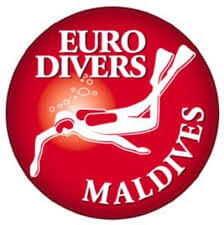
Diving in the Maldives is sublime, from the amazing abundance of marine life (including Manta Rays and Whale Sharks) to the spectacular variety of corals.
Vilamendhoo is surrounded by a house reef and is located between two channels, making it a divers and snorkelers paradise. The dive shop at the resort is run by Euro Divers, who first started dive activities in the Maldives over forty years ago and today operate dive shops in nine different countries, including in 12 different resorts in the Maldives.
On offer are PADI dive courses, trial dives and a comprehensive selection of dive packages, all of which can be booked in advance from their website.

The Euro Divers Dhoni, ready to take us to our next dive sight.
Boat dives (using a traditional wooden “Dhoni“) are conducted twice a day, with two-tank dives departing each morning at 08:15 and single-tank dives departing each afternoon at 14:15.
During my stay, I did three well-organised boat dives (e.g. all equipment waiting on the boat / punctual departures/ full site briefing while en-route/ well guided dives with a maximum amount of time in the water/ plus a cup of hot tea once back on-board the boat). If I ever get to return I will stay longer and book their 36-dive package.

The waters around Vilamendhoo Island are teeming with sharks, with baby sharks constantly seen cruising along the shoreline.
Independent Travel
Maafushi Island

All the streets on Maafushi Island are sandy laneways.
Located in the South Malé Atoll, a 30-minute speedboat ride from the airport or downtown Malé, Maafushi is the epi-centre of the burgeoning ‘independent travel’ scene in the Maldives. With it’s sand streets lined with palm trees, guest houses, cafes, restaurants, dive shops and souvenir stalls, Maafushi has a relaxed, laid-back, holiday atmosphere.

Typical Maldivian seascape as painted by Maafushi Island resident artist – Ibrahim Shinaz.
In 2010, the White Shell Beach Inn was the first guest house in the Maldives to be granted a licence to operate on a local island. Since then, scores of guest houses and hotels have sprung up on Maafushi with more under construction at the time of my visit.

With a strict dress code in force, Bikini’s can only be worn on one beach on Maafushi Island, the aptly named ‘Bikini beach’.
The accommodation scene on Maafushi is evolving rapidly. The original single-story guest houses are now looking old and dated and, are being upstaged by their neighbours – the new kids on the block – who are fancier, taller and include facilities such as indoor pools and business centres.
Independent travellers do not have the island to themselves, with package tourists from Eastern Europe and China arriving by the boat load.

Suzy is the proud owner of the ‘Fine Bake’ bakery, the best bakery on Maafushi Island which is renown for its ‘pineapple upside down’ cake.
In between the hotels, a host of businesses have opened to service the needs of travelers. Enterprising locals have opened art studios, cake shops, cafes, restaurants, laundries and gift shops. If you wish to see how beneficial tourism can be to a local economy there’s no better example than Maafushi.
One of my favourite local businesses (which I patronised everyday) was the Fine Bake Bakery which is owned and operated by the wonderful Suzy. Her cakes are amazing (especially her upside-down pineapple cake) and I’m happy to say I sampled most of them all during my stay.

Local artist, Ibrahim Shinaz (right), in his studio on Maafushi Island.
If you’re looking for a unique, hand-painted souvenir from the Maldives, you’ll find plenty of treasures at the art studio of Ibrahim Shinaz.
Where’s the beer?

No alcohol? No problem! Fresh fruit juices in the Maldives are delicious and a great way to detox!
If you like to party when on holiday you should know that the sale and consumption of alcohol is banned in the Maldives – with the only exceptions being private-island resorts and live-aboard boats which exist in their own bubble.
The importation of alcohol into the Maldives is forbidden!

Hand-painted souvenirs of the Maldives, from the studio of Ibrahim Shinaz on Maarfushi Island.
This ban includes Maafushi, but thirsty travellers will be happy to know that enterprising entrepreneurs have opened an offshore floating bar – Maha floating bar & restaurant – which is moored just offshore in the lagoon. If you wish to join the festivities, speedboat taxis will transfer you in minutes from the port to the boat.

A traditional boat on Maafushi Island, which is a centre of boat building.
Maafushi Dive

One of the friendly dudes from Maafushi divers.
While on Maafushi I did four dives with Maafushi dive. The dive shop is operated by a friendly bunch of young, local hipsters who ‘live and breath’ diving.
On my first dive I lost count of the amount of sharks (white-tip and grey reef) we saw while diving at 30-metres (98 feet) through a channel. The variety and abundance of marine life in the Maldives has to be seen to be believed.

Maldivian sunset by Maafushi Island artist – Ibrahim Shinaz.
Malé Sightseeing
While the main sights of the Maldives are the myriad coral islands, their white-sand beaches, the reefs and incredible variety of marine life – the capital city of Malé offers some cultural distractions worth investigating.

A panoramic view of crowded Malé from my TMA flight from Vilamendhoo Island Resort.
Most tourists to the Maldives skip Malé, travelling instead from the airport direct to their island resort. Malé is however an interesting capital, offering enough sights to easily hold your attention for a day.

Locals playing Chess in a cafe in Malé.
I arrived here after time spent relaxing on the islands and was happy to immerse myself in the hectic, crazy, bustling, cacophony of the city.

An aerial view of crowded Malé, one of the most densely populated cities in the world.
The first thing that strikes you about Malé is how compact and crowded it is. With a population of 133,412 squeezed into an area of just 5.8 square kilometres (2.2 square miles), Malé is one of the world’s smallest national capitals and is also one of the most densely populated cities in the world.
The island is easily walkable, being 1.7 kilometres long and 1 kilometre wide, which is a good thing since the streets are constantly jammed with traffic.
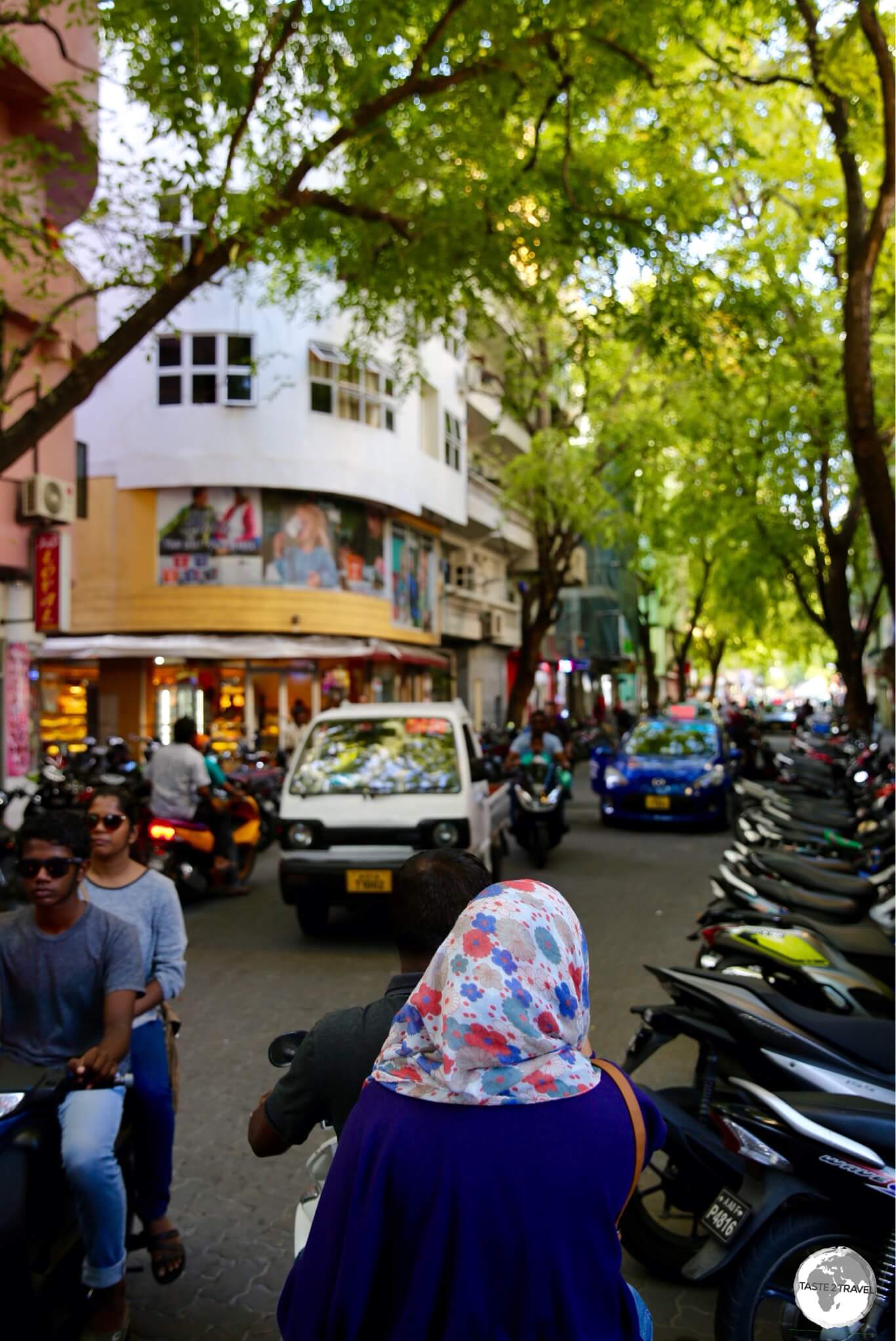
The narrow, bustling streets of Malé are always congested with parking spaces difficult to find.
All of this makes Malé the 5th most densely populated piece of real estate on the planet, having a population density of 47,416 inhabitants per square kilometre. With the streets constantly congested, the best way to explore tiny Malé is on foot.
National Museum

Old Malaafaiy lacquered wooden food cover, one of the displays at the National Museum.
Housed in a modern Chinese-built eye-sore, the Maldives’ National Museum provides a good overview of the history of the country and includes a range of historical artefacts, ranging from stone & wooden objects to royal antiquities. If you have an interest in learning more about Thaana or how the country converted from Buddhism to Islam then this is a good place to start. On the ground floor, there’s a philatelic display and a post office counter where you can buy stamps.
Produce & Fish Market

Shopping at the central market in Malé.
Due to the lack of soil in the Maldives, most produce is imported, with most of it ending up at the local market. Located on the waterfront adjacent to the fish market, the whole neighbourhood is one big sprawling bazaar with fish also being sold directly from fishing boats.

The Fish market is located on the waterfront in downtown Malé.
Dhivehi

Dhivehi, a local delicacy of cured tuna, can be purchased at the Fish market in Malé.
A speciality for which the Maldives is famous is Dhivehi – cured tuna fish. To prepare Dhivehi, the tuna is cut in a particular way, boiled in water, smoked then sun-dried it until it’s like a piece of wood.
If you wish to purchase some, you’ll find plenty of it at the market, vacuumed packed, ready for export. Chefs throughout the country include Dhivehi in dishes in creative ways. I once had a spaghetti Carbonara which was topped with flakes of Dhivehi rather than bacon.

A speciality of the Maldives, Dhivehi can be found in menus throughout the country.
Areca Nut
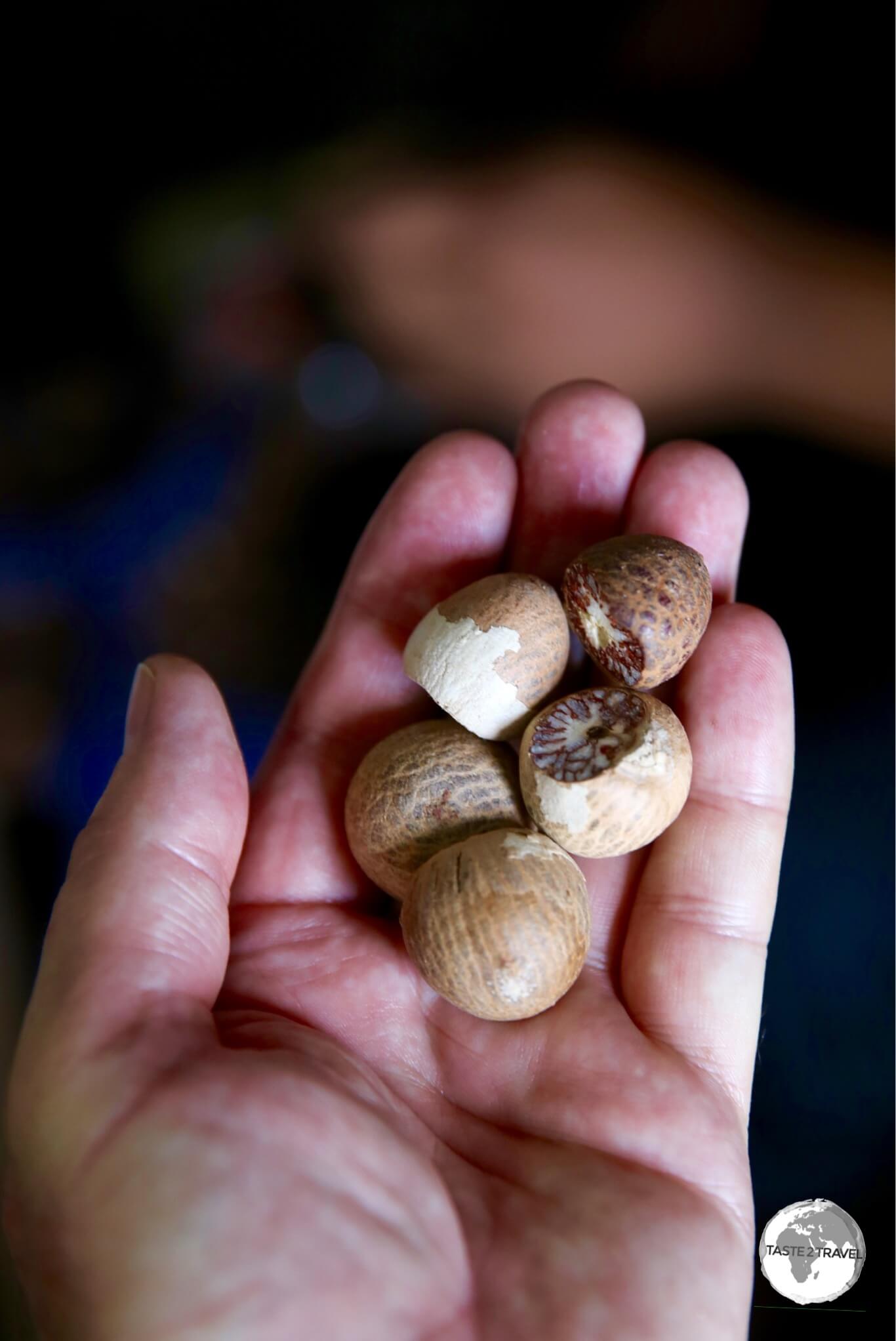
Dried Areca nuts at the Malé central market.
The chewing of Areca nut is a national pastime and there’s no better place to gain an understanding of everything Areca than at the central market in Malé.

Areca nuts being sliced by hand a the central market in Malé.
Consumed as a stimulant, the nut grows in all tropical regions of the world and is commonly known as Betel nut since it is usually wrapped in a betel leaf along with a dash of ‘Huni’ (lime paste) before being chewed.

Sliced Areca nuts are either eaten raw or wrapped in Betel leaf.
In the Maldives people prefer to chew thin slices of the dry Areca nut as a snack, which is akin to chewing on a piece of wood.

The preferred wrapper for Areca nut, Betel leaf on sale at the central market in Malé.
Friday Mosque & Cemetery

Constructed in 1153, the Friday Mosque in Malé is the oldest mosque in the Maldives.
Despite being covered by an ugly protective corrugated-iron sheet roof, the historical Malé Friday mosque (the oldest in the Maldives) is a beautiful and fascinating sight.
The current mosque was constructed in 1658, over an earlier mosque, which was constructed in 1153 by the first Muslim Sultan of the Maldives, Mohamed Bin Abdullah, after his conversion to Islam.
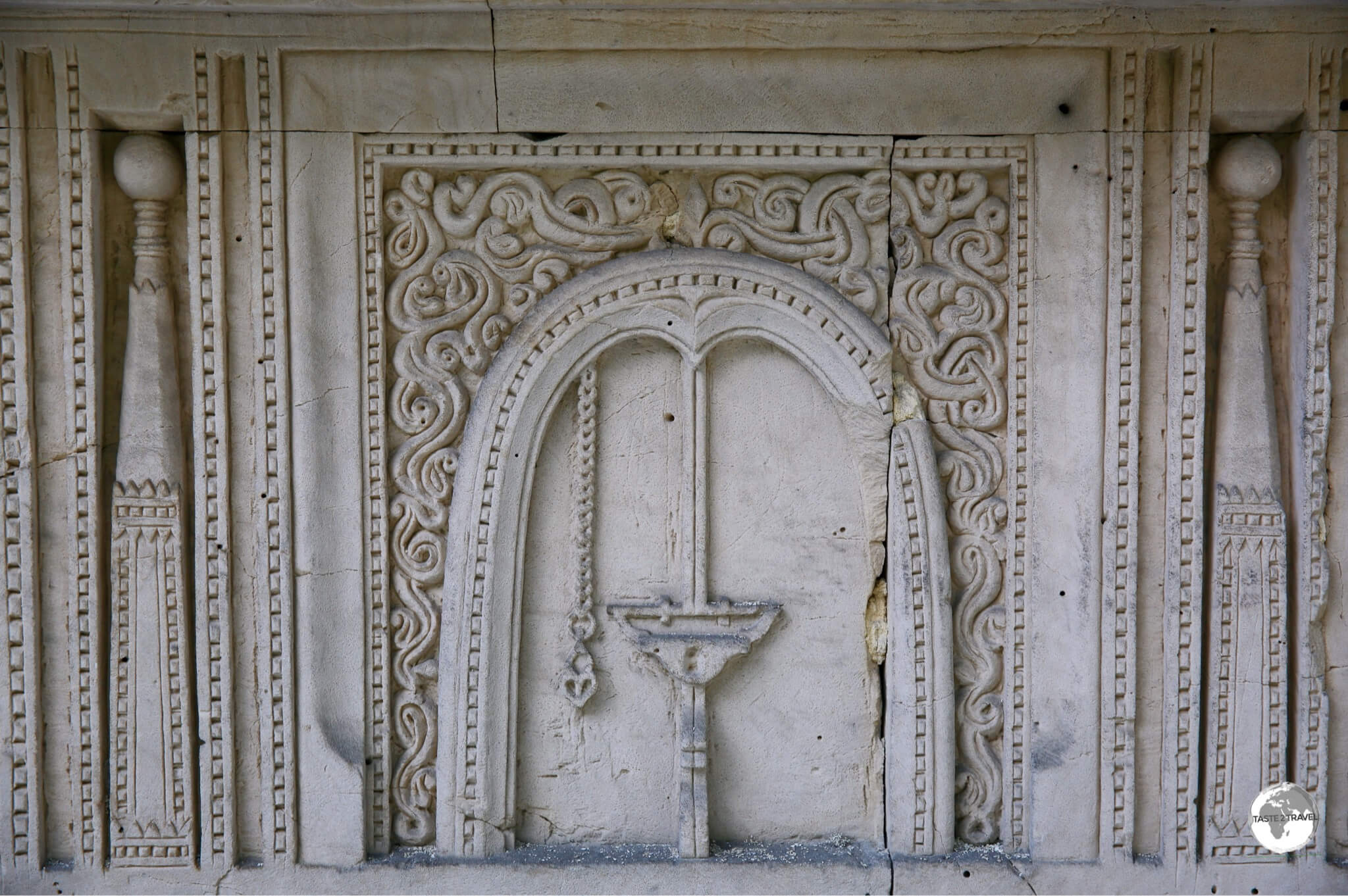
Intricate coral stonework panel at the Friday Mosque in Malé.
The mosque is made of interlocking coral blocks, with many of the blocks carved with intricate Islamic designs.

Coral tombstones at the Friday mosque cemetery.
Surrounding the Friday mosque is the most beautiful cemetery in the capital. Carved coral tombstones distinguish males, females, sultans and their families. Women’s tombstones have rounded tops; men’s have pointed tops, and inscriptions for royalty are gilt.
Presidential Residence

Mulee’aage – the modest residence of the President of the Maldives.
Opposite the Friday mosque is Mulee’aage – a small, unpretentious cottage which, since 2009, has served as the residence of the president. Built in 1914, the residence was built in a colonial style which was popular in Sri Lanka at the time.
Grand Friday Mosque

The Islamic Centre in Malé is home to the Grand Friday Mosque, one of the largest mosques in Asia.
Located on the grounds of the Islamic Centre in downtown Malé, the modern Grand Friday Mosque is the largest in the Maldives, and one of the largest in Asia, admitting over 5,000 worshippers. The mosque is free to visit outside of pray times, provided you’re dressed appropriately.
Coup d’état Memorial

Adjacent to the Islamic centre in Malé is a memorial to the failed 1988 coup d’état.
In front of the Islamic centre is a memorial to the 1988 Maldives coup d’état, which was an attempt to overthrow the government, led by a group of Maldivians, who were assisted by armed mercenaries from Sri Lanka. The coup failed due to the intervention of Indian Armed Forces.
Accommodation

My deluxe room at the Vilamendhoo Island Resort and Spa.
In a country where tourism is the #1 industry, there’s no shortage of accommodation options and while deluxe resorts have existed for many decades, budget guest houses are now also available.
Malé

The very comfortable 4-star Champa Central hotel is located in the heart of Malé.
There are many different accommodation options tucked away in the crowded streets of Malé. I chose to stay at the 4-star Champa Central Hotel (CCH), which is located in the heart of the city. CCH is part of Crown & Champa Resorts, who own seven resorts throughout the Maldives.
Outside the hotel the city streets are chaotic, busy and congested – but inside, there’s a relaxed air of calm – and, in a city that’s tight on space (almost claustrophobic at times), the rooms at CCH are wonderfully spacious.
A buffet breakfast is served each morning in the top floor restaurant and a rooftop terrace is open every evening – a great place to watch the sunset over the city. Transfers are provided between the hotel and the ferry dock.

The spacious and quiet rooms at the Champa Central hotel in central Malé offer a welcome respite from the over-crowded streets outside.
Vilamendhoo Island Resort and Spa

Interior of my beautiful Beach Villa at Vilamendhoo Island Resort and Spa.
The 4* Vilamendhoo Island Resort and Spa offers 184 spacious, well-appointed rooms in four different categories:
- Jacuzzi Water Villas (85 sqm – located over the water)
- Jacuzzi Beach Villas (65 sqm)
- Beach Villas (55 sqm)
- Garden Rooms (55sqm)

The level of service at Vilamendhoo was outstanding – they even have their own water bottling plant.
I stayed in room #195 which was a Beach Villa. Fronting the beach and surrounded by a lush, well tendered garden, the villa was nicely decorated in a tropical style and very comfortable with free WiFi, cable TV and all mod cons.

My semi-outdoor bathroom at Vilamendhoo, well-ventilated and spacious.
My room included a large, semi-outdoor bathroom which is perfect in a tropical environment.

The ‘Jacuzzi Water Villas’ at Vilamendhoo Resort are accessed via an over-the-water boardwalk.
For those looking for something more exclusive and deluxe, the Jacuzzi Beach Villas are built over the water in the ‘adults only’ zone. The villas offer views of the lagoon, private sundeck and Jacuzzi for two with each villa providing access to the reef.
The following YouTube video provides a virtual tour of a Vilamendhoo beach villa:
Video tours of other room types are available on YouTube.
Maafushi Island

An island on the move, the many new hotels on Maafushi are being built to the 7-floor allowable limit.
Currently Maafushi Island is the most popular ‘inhabited’ island where independent travellers have a choice of accommodation from inexpensive guest houses to more deluxe hotels.
Many new hotels are currently under construction with most being built to the 7-story limit set by the government (which is six stories higher than most other buildings on the island).
While on Maafushi, I stayed at the family-run Lily Rest guest house which offers eight comfortable guest rooms. Accommodation options and prices can be found on the usual OTA (Online Travel Agent) sites such as booking.com.
Eating Out

Freshly caught Tuna is found on most restaurant menus on Maafushi Island.
Maldivian cuisine is based on three key ingredients – fish (Skipjack Tuna is the local favourite), coconuts and starches. The cuisine has been influenced through the centuries through contact with Arab, Indian and other traders.
Malé
There’s no shortage of restaurants in Malé, with well-priced buffet lunches allowing visitors the opportunity to sample various Maldivian dishes. One of my favourite places is the Sea House cafe which overlooks the Airport ferry dock and offers a good buffet lunch for 120 MVR.
Koththu Hut

It’s hard to miss the green façade of Koththu Hut in downtown Malé.
In the heart of the concrete jungle that is downtown Malé, it’s impossible to miss the very green façade of Koththu Hut which serves a selection of Maldivian dishes, specialising in grilled meats.
Vilamendhoo Resort

The sand-floor, Ahima buffet restaurant, one of several restaurants at Vilamendhoo Island Resort and Spa.
Restaurants
Thrice daily buffets are included in the room rate and are served in two ‘sister’ restaurants (loved the sand floors) which serve the same meals; the Funama restaurant caters to families while the Ahima restaurant is in the ‘adults-only’ section of the island.
I ate my meals at the Ahima restaurant where the service, selection, variety and quality of food was outstanding. Just to keep the offering interesting (most people are here for at least a week), different theme nights are held with Friday being Maldivian night, offering guests the opportunity to sample delicious Maldivian cuisine.

Flags out for the Maldivian night at the Ahima restaurant at Vilamendhoo Island Resort and Spa.
You would think with all the diving and snorkeling that I would have lost weight at Vilamendhoo, but no – the food was far too good so I gained a few pounds. You can view a sample Buffet menu here.

Temptation everywhere! The divine offerings at the Vilamendhoo Island Resort are not conducive to dieting!
If you wish to take a break from the buffet offerings, there are two ‘optional’ à la carte restaurants to choose from:
- Asian Wok Restaurant – An over-the-water restaurant with a menu specialising in Asian cuisine.
- Hot Rock Restaurant – A restaurant whose menu features local seafood, chicken, steak and more all of which is cooked on ‘hot rocks’ at your table.
Bars

Comfortable lounges line the sand floor of the Sunset Bar at Vilamendhoo Resort.
Being a private-island resort, alcohol is freely available at Vilamendhoo, who provide four bars to keep their guests hydrated:
- Bonthi bar – Located next to the Funama restaurant, this is the main bar and the venue for nightly activities.
- Sunset bar – located in the ‘adults only’ section of the island, next to the Ahima restaurant and Sunset pool.
- Boashi bar – located next to the Boashi pool in the ‘family’ section of the island.
- Asian Wok bar – not surprisingly – this bar is located in the Asian Wok restaurant.
For more on Vilamendhoo, refer to the ‘Deluxe Travel – Vilamendhoo Resort’ section above.
Maafushi Island

Illuminated palms at the Summer Kitchen & Bakery on Maafushi Island.
Various hotels on Maafushi offer dinner buffets for US$15, serving international and local fare. If you prefer beach-side dining while listening to live music, the Arena Beach Hotel is the place to be. The Summer Cafe and Bakery is owned by Chinese expatriate Summer who offers delicious Chinese meals made from local seafood. The Stingray cafe offers a selection of traditional Maldivian food, including a flavourful tuna curry.
Mas Huni

Freshly made Mas Huni with roti, served at breakfast by my guest house on Maafushi Island.
Mas Huni is a typical Maldivian breakfast dish, composed of tuna, onion, coconut, and chili.
All ingredients are finely chopped and mixed with the grated meat of the coconut. This dish is usually eaten with freshly baked roti flatbread and sweetened hot tea.
Recipe
- 1 cup diced smoked tuna
- 1 cup scraped coconut
- 1 finely chopped onion
- 1 finely chopped Chinese capsicum
- Lime juice and salt to taste
- Mash together the onions, capsicum, lime juice and salt.
- Mix in the tuna until it is well combined and add the coconut.
- Serve with roti bread.
Visa Requirements

Maldives passport stamps.
The visa policy of the Maldives is wonderfully straight-forward with every nationality being granted a 30-day stay. The two exceptions to this rule are for Indian nationals (who can stay for 90 days) and nationals of Brunei who are granted a 15-day stay.
Getting There
Air

A view of Velana International airport which is currently undergoing an $800-million expansion.
International flights arrive at Velana International Airport, which is located on the island of Hulhulé – 1.3 km across the water from Malé.
Thanks to the introduction of services by low cost carriers, reaching the Maldives is now more affordable than ever. If you’re in SE Asia, AirAsia (sigh!) offer cheap return flights from KL as do Scoot (better!) from Singapore. From Thailand, Bangkok Airways and Thai AirAsia offer regular services.
The airport serves as the base for the national carrier – Maldivian – who operate International and domestic flights.
The following airlines provide scheduled services to/ from Velana International Airport:
- Aeroflot – flies between Moscow–Sheremetyevo
- AirAsia – flies between Kuala Lumpur–International
- Air France – flies between Paris–Charles de Gaulle
- Air India – flies between Bangalore, Delhi, Thiruvananthapuram
- Bangkok Airways – flies between Bangkok–Suvarnabhumi
- Beijing Capital Airlines – flies between Beijing–Capital
- Cathay Pacific – flies between Hong Kong
- China Eastern Airlines – flies between Colombo, Kunming, Shanghai–Pudong
- China Southern Airlines – flies between Colombo, Guangzhou
- Condor – flies between Frankfurt
- Emirates – flies between Colombo, Dubai–International
- Etihad Airways – flies between Abu Dhabi
- Flydubai – flies between Colombo, Dubai–International
- Flyme – flies between Dharavandhoo, Maamigili
- Korean Air – flies between Colombo, Seoul–Incheon
- Maldivian – flies between Bangkok–Suvarnabhumi, Changsha, Chengdu, Chennai, Chongqing, Dhaka, Dharavandhoo, Fuvahmulah, Fuzhou, Gan, Hanimaadhoo, Hangzhou, Kaadedhdhoo, Kadhdhoo, Kooddoo, Nanjing, Thimarafushi, Thiruvananthapuram, Wuhan, Xi’an
- Qatar Airways – flies between Doha
- Saudia – flies between Riyadh, Jeddah, Colombo
- Scoot – flies between Singapore
- SilkAir – flies between Singapore
- Singapore Airlines – flies between Singapore
- Spicejet – flies between Kochi, Thiruvananthapuram
- SriLankan Airlines – flies between Colombo
- Thai AirAsia – flies between Bangkok–Don Mueang
- Turkish Airlines – flies between Istanbul–Atatürk
Airport Expansion

Land on Hulhule Island is being reclaimed by a Chinese contractor as part of the airport expansion project.
Velana International airport is currently undergoing an $800-million expansion (mostly funded by the Chinese government) which will include a longer runway. The new runway, which can accommodate the world’s largest passenger airliner – the Airbus A380, will be operational by mid-2018.
Additionally, a new terminal will cater for up to seven million passengers per year and a new Chinese-funded bridge will provide a road link from the airport to downtown Malé.

A view of the Chinese-built SinaMalé Bridge, which was under construction at the time of my visit in 2017. It opened in August of 2018.
Resort Transfers
Most hotels and resorts maintain a booth at the airport, providing smooth transfers to their respective properties either by seaplane or boat.
Seaplane Transfers

Trans Maldivian Airways (TMA) operate the largest fleet of seaplanes in the world.
The Maldives is home to the biggest seaplane operation in the world with flights operated by Trans Maldivian Airways (TMA). All check-in procedures take place in the International terminal with passengers being transferred in mini-buses (luggage is transferred in separate vans) to the seaplane terminal on the opposite side of the island. Refer to the ‘Getting Around – Air‘ section below for more details.
Boat Transfers
Resort Transfers
If you’re staying at a resort located close to the airport, you’ll be transferred by boat, with all boats departing from the front of the airport.
Maafushi Transfers
If you’re staying on Maafushi Island, you can reach the island in 30 minutes by speedboat directly from the airport. There are currently three operators offering frequent services to Maafushi Island – refer to the ‘Getting Around – Speedboat‘ section below for more details.
Airport – Malé Ferry

The airport ferry dock and waterfront in downtown Malé.
Prior to the completion of the Chinese-built SinaMalé Bridge in mid-2018, the only way to reach Malé from the Airport was via the popular Airport ferry. The journey from the airport to the centre of Malé is just just 10-minutes with a ticket costing 10 MVR.

Riding on the airport ferry from the airport to Malé which is a 10-minute crossing.
Despite the completion of the bridge, the very popular ferry still remains a favourite form of transport for those travelling to the airport, offering a fast and convenient connection between the airport and city centre.

The Airport ferry docked outside Velana International airport.
Ferries depart as per the following timetable:
- From the Airport to Malé (all days, except Friday)
– Every 10 minutes from 06:00 am to 02:30 am
– Every 30 minutes from 02:30 am to 04:00 am
– Every 15 minutes from 04:00 am to 06:00 am - From Malé to the Airport (all days, except Friday)
– Every 10 minutes from 06:00 am to 02:30 am
– Every 30 minutes from 02:30 am to 04:00 am
– Every 15 minutes from 04:00 am to 06:00 am - On Fridays ferries operate every 10 minutes from 06:00 am to 00:00 am
Getting Around

A spectacular view from the window of my TMA flight en-route to Vilamendhoo resort.
Air

A TMA seaplane landing at Vilamendhoo Resort and Spa.
The Maldives offer many spectacular resorts, most of which are located on secluded, remote islands far from Malé. The only feasible (i.e. timely) way of reaching these resorts is via seaplane with almost all flights operated by Trans Maldivian Airways.
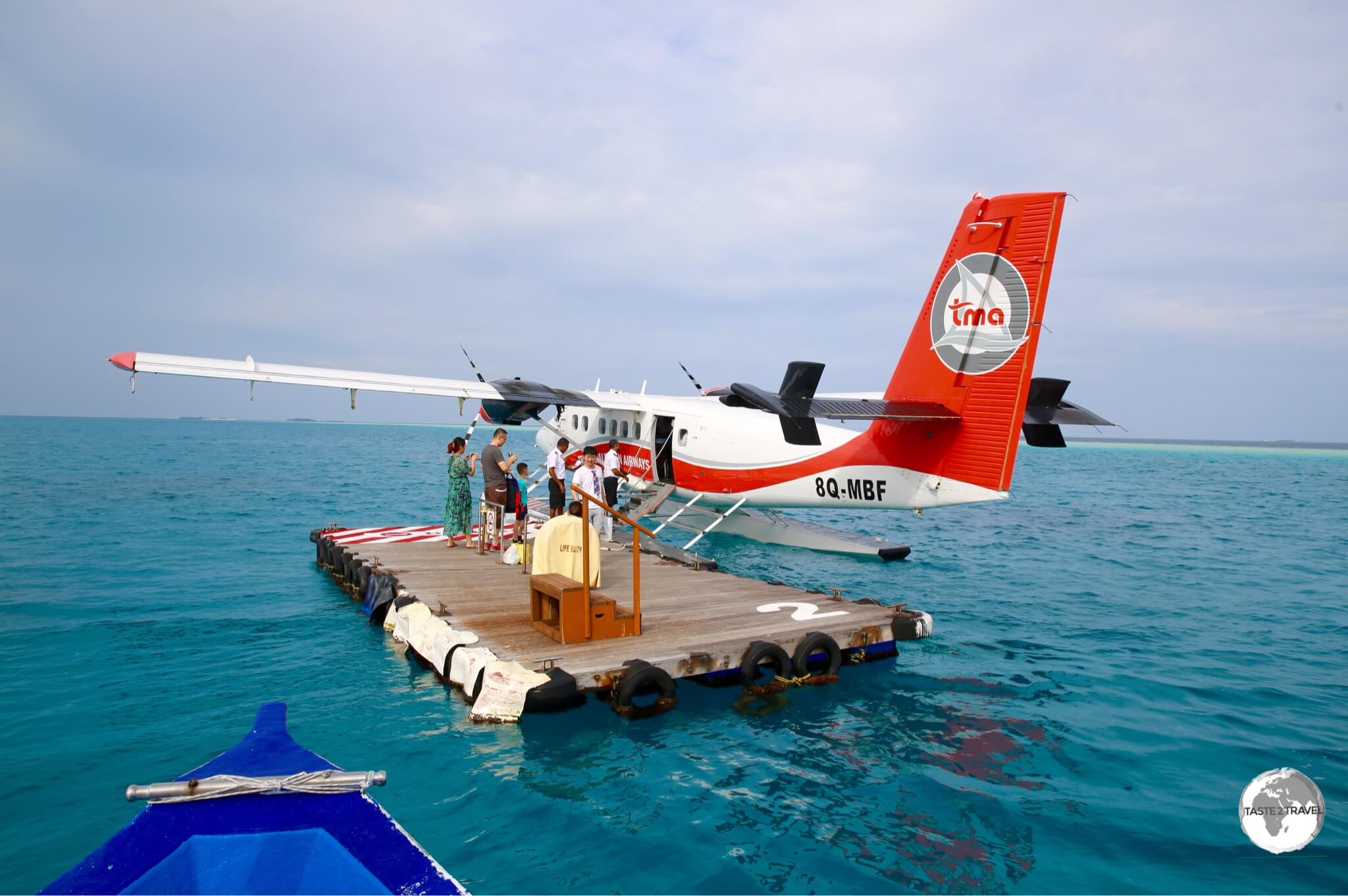
A TMA De Havilland Twin Otter at Vilamendhoo Resort and Spa.
With a fleet of 48 (18-seater) de Havilland Twin Otters, TMA operate the largest seaplane fleet in the world and offer a comprehensive network of daily flights throughout the archipelago.

A TMA seaplane at Vilamendhoo resort.
All seaplane transfers are made during daylight hours, and offer spectacular views of the atolls, islands, reefs and lagoons.
The cost of a ticket is between US$250 and US$450 return, depending on the distance and the arrangement made with the resort with the ticket price generally included in the resort package price.
Ferry

The Maafushi Ferry docked at the Viligili Ferry Terminal in Malé.
Ferries are an important mode of transport in this atoll nation with most services originating in Malé. The ferry to Maafushi (2 hours/ 30 MVR) departs from Jetty 1 at the Viligili Ferry Terminal in Malé each day (except Friday) at 3 pm with a stop en-route at Gulhi island. While the ferry provides a passenger service its more important function is that of a freight service, with the boat normally packed to the rafters with all sorts of goods.

The Maafushi ferry is not just a passenger ferry! It provides an important freight service (including car carrying) to the island.
Speedboats

The fast and comfortable speedboat to Maafushi Island.
Speedboats to various destinations provide a faster, more comfortable, connection than the slower ferries, with most boats departing directly from the the airport and/ or the dock in downtown Malé.
Comfortable, frequent speedboats connect Maafushi island to the airport and downtown Malé, with the 30 minute passage costing (for foreigners) US$25. Services are provided by the following (Maafushi-based) operators:
- Maafushi Tours – Offers four daily transfers each way. Check their website for the current schedule.
- iCom Tours – Offers three daily transfers each way. Check their website for the current schedule and seat availability for each sailing.
- Arena Hotel – Offers three daily transfers each way. Check their website for the current schedule.
Taxi
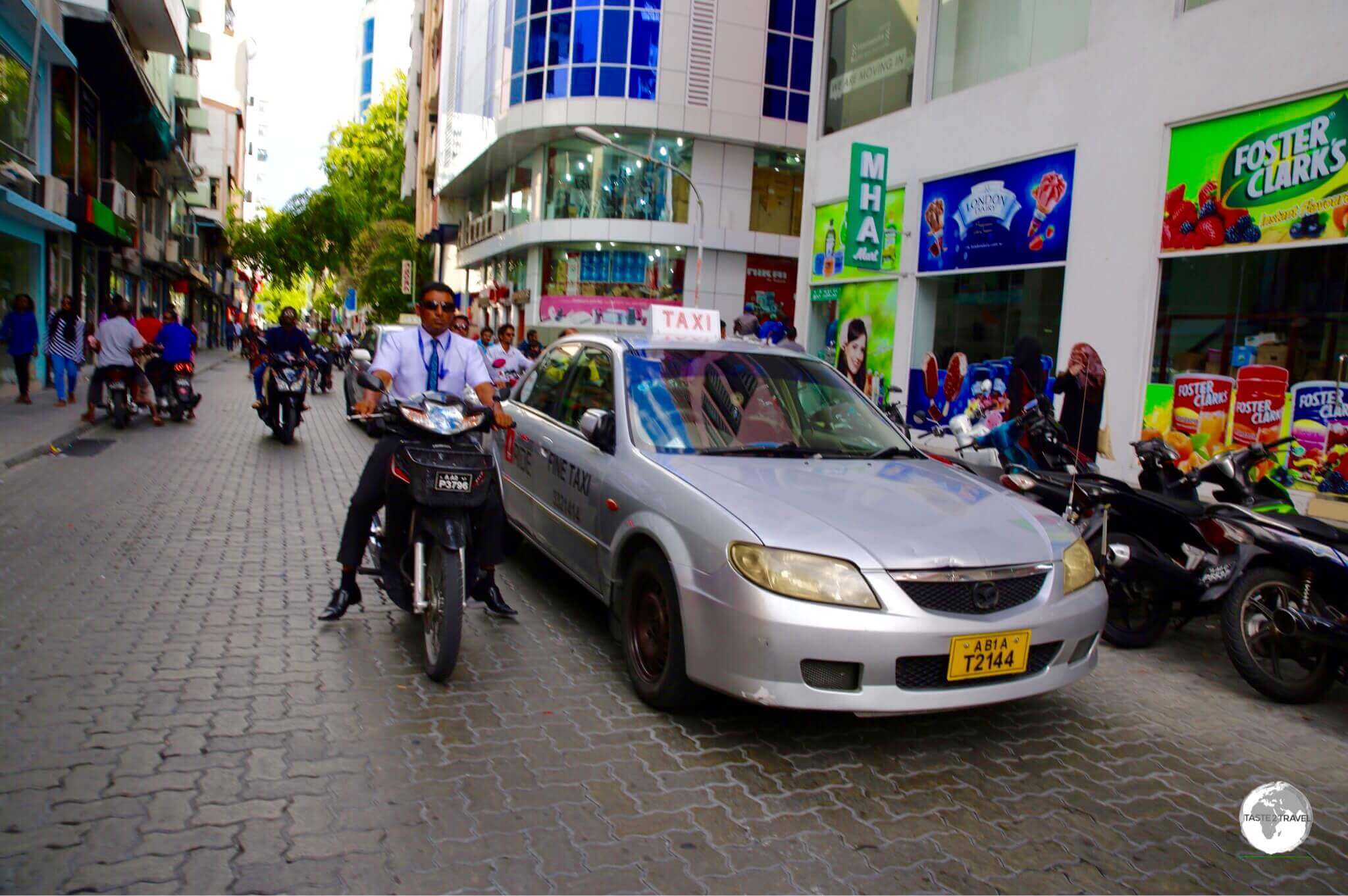
Taxi’s on Malé cost just a couple of dollars to any destination on the island.
Unmetered taxi’s (fares should be confirmed in advance) are available in Malé with most destinations on the island costing 20-30 MVR with an extra charge of 5 MVR for luggage.
Motorbikes

Scooters are everywhere in congested Malé.
The most popular form of transport on congested Malé is the motorbike, with an estimated 15,000 registered bikes (representing 1 bike for every 6 residents) buzzing around the tiny, crowded island.
Maldives Car Rental Myth
While you can search online for ‘Maldives Car Rental‘ – and you will receive results from all the usual websites – once you click through you will find that, strangely, there are no rental cars available. That’s because there are no rental cars in the Maldives. The only urban area in the country is the densely packed capital of Malé which is best explored on foot, most of the other islands have no roads.
Bus
There are no bus services in the Maldives.
That’s the end of my Maldives Travel Guide.
I look forward to hearing feedback from you if you use this guide for your visit to the Maldives.
Safe Travels!
Darren
Follow me on Instagram:
[instagram-feed feed=1]
Further Reading
You might also be interested in reading other taste2travel guides from the region, such as my:
Maldives Travel Guide Maldives Travel Guide Maldives Travel Guide Maldives Travel Guide Maldives Travel Guide Maldives Travel Guide Maldives Travel Guide Maldives Travel Guide Maldives Travel Guide Maldives Travel Guide Maldives Travel Guide Maldives Travel Guide Maldives Travel Guide Maldives Travel Guide Maldives Travel Guide Maldives Travel Guide Maldives Travel Guide Maldives Travel Guide Maldives Travel Guide Maldives Travel Guide Maldives Travel Guide Maldives Travel Guide
Author: Darren McLean
Darren McLean is an Australian, full-time, digital nomad who has spent 37 years on a slow meander around the globe, visiting all seven continents, 192/ 193 UN countries and 245/ 251 UN+ countries and territories.
He founded taste2travel to pique one’s curiosity and inspire wanderlust.







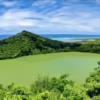





Beautiful place❤❤❤,your blog is amazing!keep it up?
Thanks Maybel! I’m pleased you’re enjoying the blog.
looks like an amazing place to visit!
Thanks Sonia! The Maldives is a fascinating destination – one that should be on everyone’s bucket-list.
The Maldives is an amazing destination for people who love the beach life.
I have been there once, and wish to be back.
Your guide was impressive and photos are mind-blowing.
Hi Christina,
The Maldives is a magical destination and I too cannot wait to return one day.
Many thanks for your positive feedback, I’m pleased you enjoyed my report.
Safe Travels!
Darren
So amazing 😍😍😍
Thank you honey 😊😊😍